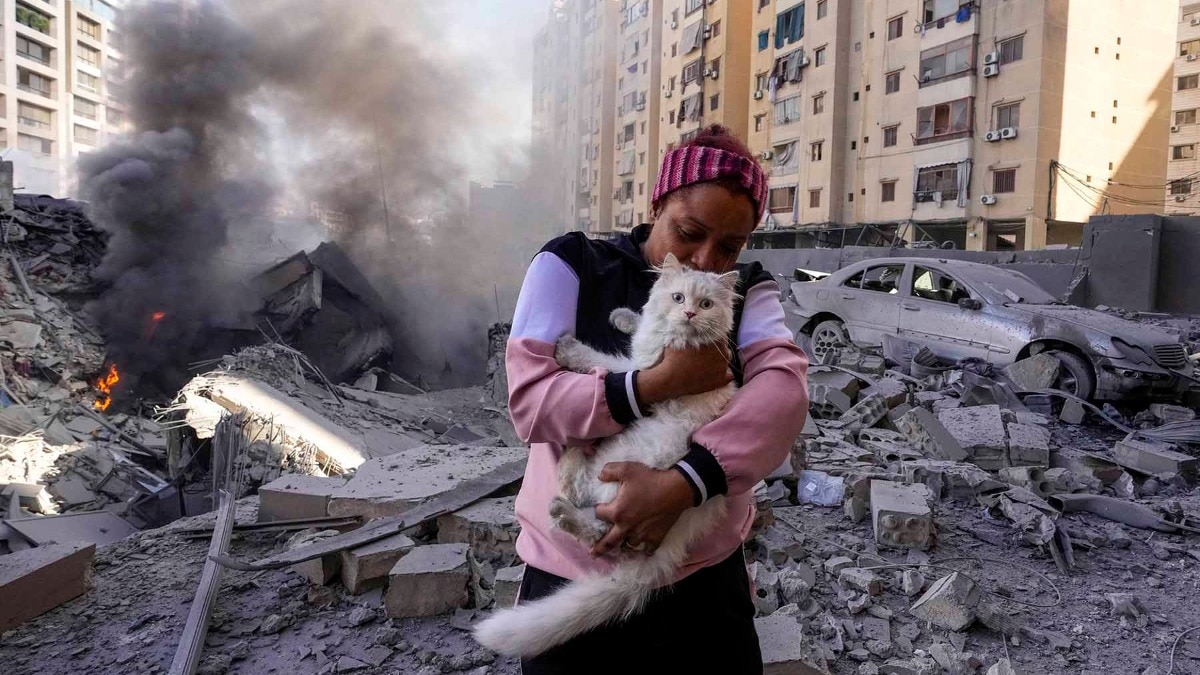2024-11-28 12:37:48
This photo essay captures the destruction and human toll of the Lebanon-Israel conflict leading up to the ceasefire. The series of images provides a powerful visual summary of the events from the outbreak of the war to the fragile peace that followed, reflecting both the devastation in Israel and Lebanon, and the profound loss of life on both sides.
ISRAELI MILITARY RESPONSE TO GAZA
An Israeli M109 155mm self-propelled howitzer fires rounds near the Gaza border in southern Israel on October 11, 2023. Israel declared war on Hamas on October 8, following a surprise assault by the Gaza-based militant group. This multi-front attack – by land, air, and sea – marked the deadliest assault in Israel’s 75-year history. Over 1,200 people were killed in Israel, and Gaza officials reported over 1,000 fatalities as the war escalated. This image encapsulates the scale of Israel’s military response to the ongoing violence.
RUN FOR COVER
A man runs for cover as smoke billows into the sky following an Israeli airstrike in Dahiyeh, a district in Beirut, Lebanon. The intense airstrikes, part of Israel’s retaliation against Hezbollah and other militant groups, have left large areas of southern Lebanon devastated. This image highlights the vulnerability of civilians amidst aerial bombardments, as well as the ever-present threat of violence in conflict zones.
READY FOR BATTLE
An Israeli soldier carries a shell next to a tank in northern Israel. This image shows the military preparations as Israeli forces mobilised in response to the escalating conflict. Tanks and artillery were deployed across various fronts, particularly in the northern regions, as Israeli forces anticipated further rocket fire from Lebanon and Hezbollah. The image underscores the military readiness and tension in the region.
The recent Israel-Hezbollah ceasefire, led by the United States and France, marks a crucial turning point in the Middle East. With a 60-day timeline, the agreement requires Israel to withdraw from southern Lebanon and Hezbollah to retreat north of the Litani River. But who benefits the most? While President Biden claims a diplomatic win, Netanyahu faces criticism, and Lebanese citizens continue to bear the brunt of the conflict.
DESTRUCTION IN RAMAT GAN
A man looks out from a damaged building in Ramat Gan, central Israel, a day after it was struck by a rocket fired from Lebanon. This image portrays the heavy damage to civilian infrastructure in Israel, a direct consequence of the rockets launched from Hezbollah-controlled areas in southern Lebanon. The destruction of homes and public spaces has left many in both countries living in constant fear of further attacks.
AERIAL STRIKE IN BEIRUT
A bomb is released from an Israeli jet about to strike a residential building in Tayouneh, Beirut, Lebanon. Israeli airstrikes, aimed at disrupting Hezbollah’s operations and military infrastructure, have caused extensive civilian casualties in Beirut. This dramatic image illustrates the ongoing aerial bombardment campaign, which has left countless buildings in ruins, with civilians bearing the brunt of the destruction.
JOURNALISTS COVERING THE AFTERMATH
A journalist films massive plumes of smoke rising from buildings hit by Israeli airstrikes in Tyre, southern Lebanon. The city has been a focal point of Israeli military operations, and the constant barrage of airstrikes has left a significant mark on the city’s skyline. The image emphasises the role of journalists in documenting the ongoing conflict and the toll it takes on both people and infrastructure.
MOURNING THE LOSS
Mourners from the Druze community gather around the bodies of 12 children and teens killed in a rocket strike on a soccer field in Majdal Shams, in the Israeli-controlled Golan Heights. This attack, one of the deadliest on an Israeli target along the northern border since the conflict began, highlights the indiscriminate nature of the violence. The emotional toll of this loss is felt deeply in both the Druze community and the broader region, where children and young people have become tragic victims of the ongoing conflict.
A FUNERAL IN GAN YAVNE
Mourners gather around the five coffins of the Kotz family during their funeral in Gan Yavne, Israel. The Kotz family was killed by Hamas militants on October 7, when their home in Kibbutz Kfar Azza near the Gaza border was attacked. The massacre was part of the initial wave of Hamas assaults, which left over 1,400 people dead and hundreds captured. This image highlights the personal toll of the conflict on Israeli families, as well as the emotional and societal wounds caused by such brutal acts of violence.
THE WEIGHT OF SURVIVAL
A woman carrying her child past a destroyed building in Tyre, Lebanon, reflects determination amidst the devastation of war. The ceasefire has brought quiet, but the ruins represent shattered lives and uncertain futures. Her protective embrace embodies the weight of survival and a fragile hope for renewal.
IN THE SHADOW OF LEGACY
A woman with a weapon stands resolutely next to a towering poster of Hezbollah’s late leader, a symbol of enduring influence. Beside her, a second woman raises her phone, capturing not just the scene, but the intersection of past legacies and present narratives in a fleeting yet potent moment of history.
The ceasefire aims to end a conflict across the Israeli-Lebanese border that has killed at least 3,768 people in Lebanon since it was ignited by the Gaza war last year, according to the Lebanese health ministry.
Lebanon-Israel, Gaza, Ceasefire, Hamas, conflict, Hezbollah
Source link
3 total views , 1 views today
